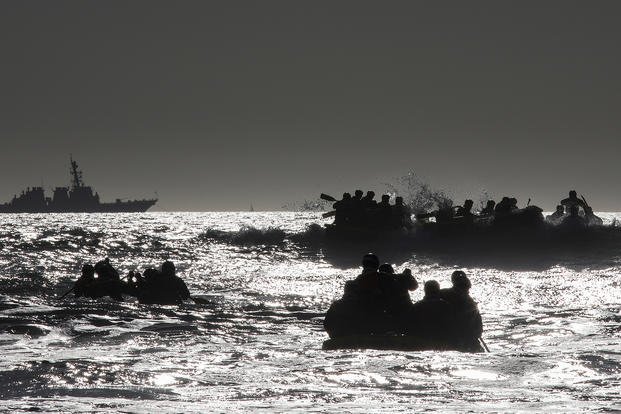Navy SEAL candidates in California are often training in water filled with bacteria that cause illnesses, a Department of Defense watchdog report found, and the service's special warfare command does not have a formal policy for monitoring water quality and relocating training.
The DoD inspector general's findings, released last week, said candidates at Naval Amphibious Base Coronado would often train in the water even when local San Diego beaches nearby were closed to the public due to high levels of "fecal indicator bacteria."
"Navy SEAL candidate exposure to contaminated water occurred because [Naval Special Warfare Command] did not follow San Diego County's Beach and Bay Water Quality Program's beach closure postings," the inspector general report found. "As a result of Navy SEAL candidate exposure to contaminated water during training, candidates are presented with increased health risks and NAVSPECWARCOM's training mission could be impacted."
Read Next: Biography of Civil War Veteran Banned as Military Schools Cull Books and Lessons Under Trump Orders
Water contamination has been a long-standing issue in Coronado due in part to pollution from the Tijuana River Valley in Mexico, which flows to area beaches and causes significant closures to the shoreline.
Between January 2019 and May 2023 alone, the Naval Special Warfare Center reported 1,168 cases of acute gastrointestinal illnesses with symptoms such as nausea, vomiting and diarrhea among SEALs and candidates, the report stated.
A notable 39% of those cases, or 457 people, were diagnosed with those illnesses within a week of being in ocean water that surpassed the state's limits for contamination.
Between February and September 2024, "the amount of enterococcus bacteria in the water exceeded state safety levels" in 146 of 192 tests, or 76%, conducted on samples retrieved from the beach north of Naval Amphibious Base Coronado and 27 of 36 tests, or 75%, of samples tested from the beach south of the base, the report detailed.
But Naval Special Warfare Command relocated only 12 of 265 Navy SEAL candidate water training exercises, or roughly 5%, within that same time period, according to the report. Additionally, on a visit during "Hell Week" in 2023, the inspector general report noted the command did not reschedule or relocate training on three occasions when nearby beaches issued closure advisories for excessive enterococcus bacteria.
"Consequently, Navy SEAL candidates were exposed to contaminated water during these three ocean training events," the report said.
DoD Inspector General Robert Storch was suddenly fired last month by President Donald Trump -- along with watchdogs from agencies across the federal government who were tasked with finding waste, fraud and abuse. Storch and other inspectors general, including Michael Missal who served at the Department of Veterans Affairs, sued the Trump administration this week, saying the firings violated federal law.
The DoD inspector general recommended that the Navy establish protocol and policy for "relocating, rescheduling, or canceling water training when bacteria levels exceed state health standards," as well as establish roles for monitoring water quality.
The inspector general also recommended that the Navy create notification procedures for relaying water quality results to Naval Special Warfare Command officials so they can amend the training schedule.
Naval Special Warfare Command, known as NSW, said in a response letter to the report, that it would be a challenge to cancel or relocate 75% of its water training activities.
Capt. Jodie Cornell, a spokesperson for Naval Special Warfare Command, told Military.com that the command follows San Diego County's Beach and Bay Water Quality Program to determine whether training needs to be modified.
"If a training site is unsafe, NSW implements mitigation strategies to reschedule or relocate evolutions to minimize impacts to training," Cornell said. "NSW's top priority is conducting training evolutions safely and using the resources available to make informed decisions. As a learning organization, NSW continues to assess procedures in place to enhance safety and operational readiness."
Local officials have recently been voicing concerns about the frequent beach closures and pollution in the ocean.
Last week, the City of Coronado began drafting a local emergency declaration, San Diego's CBS 8 reported. Notably, this past summer, mayors up and down the coastline penned a request for state and government assistance to fix the pollution crisis.
"Over one billion gallons of untreated wastewater pour into this region each month, resulting in the closure of Imperial Beach's shoreline for more than 900 consecutive days," the letter from the mayors states. "Additionally, Coronado beaches have been closed more than 50% of the time over the past two years."
Related: Pentagon Watchdog Questions Navy SEAL Training Program's Use of Sleep Deprivation











